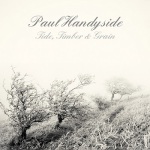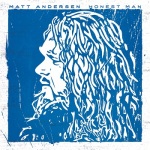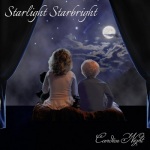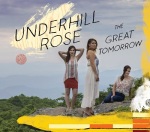 Paul Handyside’s been around for a while; thirty years, give or take, and producing work that’s almost impossible to pigeonhole; maybe ‘quality songs, beautifully delivered’ would work. This is a long way from the jangle-pop of his eighties band Hurrah!, displaying the maturity that comes from surviving the pop business and going on to create the music you want to make. Music with a more subdued palette but much more room for subtlety and finesse and a rich vein of melancholy. The album’s first song, “Flowers Won’t Bloom”, contains the line ‘the things that we planted are waiting to die’, it’s infinitely sadder than dead plants, and sets the tone for a lot of the album.
Paul Handyside’s been around for a while; thirty years, give or take, and producing work that’s almost impossible to pigeonhole; maybe ‘quality songs, beautifully delivered’ would work. This is a long way from the jangle-pop of his eighties band Hurrah!, displaying the maturity that comes from surviving the pop business and going on to create the music you want to make. Music with a more subdued palette but much more room for subtlety and finesse and a rich vein of melancholy. The album’s first song, “Flowers Won’t Bloom”, contains the line ‘the things that we planted are waiting to die’, it’s infinitely sadder than dead plants, and sets the tone for a lot of the album.
The album runs through a range of styles; all ten songs are Paul Handyside originals, although most of them could have been plucked from another era. “True Love” and “Goodnight Lover” have a strong late fifties/early sixties resonance evoking Buddy Holly and the Everly Brothers in their simplicity and purity, while the apocalyptic “All Will be Revealed” could be a late sixties protest song. “Desperate Days” taps into the melancholy singer-songwriter vein as does “Let Me down Easy” with vocals at the baritone end of his range, delicate electric guitar figures and subtle harmonies which build up as the song progresses.
“Fond Farewell, and “Should I Leave your Side” are both in the English folk tradition with picked guitar and Paul’s north-eastern accent breaking through, but it’s another two songs that really shine in this idiom. “Woodcutter’s Son”, with its a cappella intro, lovely harmonies and spurned childhood sweetheart theme is the first. The second is the sprawling “A Whaler’s Lament”, an epic, many-versed folk ballad telling the story of a young man between the years of 1905 and 1915 as he moves from whaling to mining and finally (very finally) to the wartime merchant marine. It’s a flawless piece of folk narrative.
With the assistance of Rob Tickell (guitars and percussion) and David Porthouse (double bass and melodeon), Paul Handyside has produced a hauntingly melancholy album using a variety of (mainly) traditional instruments to provide a framework for his marvellous voice; it’s a powerful combination.
“Tide, Timber and Grain” is released on Friday April 1st on Malady Music (MALCD005).
 So, where are the likely places to hear someone playing a Telecaster? On a British nineties indie record maybe; the black Tele was the indie guitar-slinger’s weapon of choice. On a country record maybe; James Burton has a couple of signature models. Springsteen? Albert ‘master of the Telecaster’ Collins? How about on a Europop or techno/folk album (whichever description you prefer) by a French artist writing in English and inspired by Tim Burton and David Lynch? No, wouldn’t have been my first choice either, but that’s exactly where we find this particular Telecaster doing its thing.
So, where are the likely places to hear someone playing a Telecaster? On a British nineties indie record maybe; the black Tele was the indie guitar-slinger’s weapon of choice. On a country record maybe; James Burton has a couple of signature models. Springsteen? Albert ‘master of the Telecaster’ Collins? How about on a Europop or techno/folk album (whichever description you prefer) by a French artist writing in English and inspired by Tim Burton and David Lynch? No, wouldn’t have been my first choice either, but that’s exactly where we find this particular Telecaster doing its thing.
But this is about more than Telecasters. Talisco is based in Paris, he’s already well-known across mainland Europe (“Run” was released in France in 2014) and this is the push to crack the UK market. He’s only started singing relatively recently (if my translation of his French Wikipedia page is accurate) and that’s a huge surprise, because his voice is powerful and distinctive with a strong resemblance to Freddie Mercury on the first two Queen albums.
A couple of songs on the album, the opener “Your Wish” and “The Keys” might even sound a bit familiar because they’ve been used to soundtrack ad campaigns in the US and Europe. They’re both a bit lively and, along with “In Love” which separates them on the album, not too representative of the work as a whole.
“Follow Me” has a very sixties, clean and heavy on the reverb, guitar sound while “Sorrow”, with its damped guitar riff hints at the dynamics of Link Wray’s “Rumble”. The early Queen references shine through on the multi-tracked vocals of the acoustic “So Old” and the piano and acoustic guitar arrangement of the album’s closer “Lovely”. The clean Telecaster intro of “Glory” has more than a hint of Mink de Ville’s “Spanish Stroll” and the intro and riff from “Everyone” is pure Ennio Morricone.
“Run” is an album packed with ideas and invention, striding effortlessly across musical styles from various eras with verve and panache. And Talisco does have a great voice. For my money, some of the more uptempo songs opening the album are a bit overdone, and overall it lacks a bit of focus, but it’s certainly an interesting listen and a pretty good hint that there’s much more to come.
“Run” is out in the UK on April 8th on Roy Music (ROY 60).
 You barely make it past the intro of the album’s opener, “Break Away”, before it hits you; Matt Andersen has a phenomenal voice. It’s a rich baritone from the same mould as the great Paul Carrack and it’s the perfect vehicle for this set of songs harking back to the glory days of Stax and Atlantic. Matt’s previous work has been filed under blues, but there’s no doubt at all that this is a soul album (with a few detours into reggae rhythms and a hint of seventies rock). The album has a lot in common with last year’s Southside Johnny classic “Soultime!” in that they’re both inspired by the glory days of sweet soul music; you can find little references to all sorts of artists and styles throughout the album, but it’s ultimately held together by that superb voice.
You barely make it past the intro of the album’s opener, “Break Away”, before it hits you; Matt Andersen has a phenomenal voice. It’s a rich baritone from the same mould as the great Paul Carrack and it’s the perfect vehicle for this set of songs harking back to the glory days of Stax and Atlantic. Matt’s previous work has been filed under blues, but there’s no doubt at all that this is a soul album (with a few detours into reggae rhythms and a hint of seventies rock). The album has a lot in common with last year’s Southside Johnny classic “Soultime!” in that they’re both inspired by the glory days of sweet soul music; you can find little references to all sorts of artists and styles throughout the album, but it’s ultimately held together by that superb voice.
The album opens with the Hammond-led gentle reggae feel of “Break Away” which hints at “Graceland”-era Paul Simon and The Staples’ “Come Go with Me”, moves into the slow and subtle soul of “The Gift” with its beautiful cascading guitar before the title track throws a whole bunch of influences into the blender. “Honest Man” opens with a riff that’s not a million miles from “Crossroads”, develops with some Memphis Horns-style brass (including the trademark rasping baritone sax) and drops into a chorus with backing vocals which could have been inspired by Don Henley’s scathing “Dirty Laundry”.
So, you get the picture; the album pulls dozens of influences into the blend without ever sounding derivative. “All the Way”, with its hint of a reggae beat, languorous vocal and wah-wah guitar has a hint of seventies Clapton, “Last Surrender” has echoes of Sam Cooke and “Who Are You Listening To?” suggests late seventies Bob Seger, both musically and lyrically. It’s a celebration of some of the classic stylings from our musical history combined with a bunch of well-constructed contemporary songs.
There are a few political and social references, but the songs cover a variety of lyrical themes including love and friendship. “I’m Giving In” is a haunting piano ballad with an intimate, late night vocal while the album’s closer, “One Good Song”, describes the things that a songwriter would suffer to create the one song that makes an audience stop and listen. It’s fair to say that he’s done that a couple of times on this album with the title track and “Last Surrender”. “Honest Man” is a joyous piece of work placing a superb soul voice in settings which demonstrate its quality to perfect effect.
“Honest Man” is released on True North Records (TND612) on April 1st.
 It’s a bit like an eclipse; the perfect gig depends on the alignment of artist, venue and audience and it doesn’t happen too often, so it was a privilege to see Martin Harley and Daniel Kimbro play to a full house at St Pancras Old Church. Martin and Daniel got together originally in the US and, after touring together, made the album “Live at Southern Ground” in a single afternoon. So the logical next step was to tour in support of the album and that’s how they came to be playing a beautiful and acoustically perfect venue just behind the Eurostar terminal.
It’s a bit like an eclipse; the perfect gig depends on the alignment of artist, venue and audience and it doesn’t happen too often, so it was a privilege to see Martin Harley and Daniel Kimbro play to a full house at St Pancras Old Church. Martin and Daniel got together originally in the US and, after touring together, made the album “Live at Southern Ground” in a single afternoon. So the logical next step was to tour in support of the album and that’s how they came to be playing a beautiful and acoustically perfect venue just behind the Eurostar terminal.
Martin and Daniel display the relaxation on stage that comes from complete mastery of your craft. Instrumentally they’re both at the top of their game, but they both have great voices and they’re accomplished songwriters. They aren’t trying to prove anything, they just want to play (and maybe sell a few albums). Throughout the set they created a rapport and intimacy with the audience, telling self-deprecating stories about life on the road and Martin’s first corndog, eaten onstage during a festival gig.
And they played some music as well, covering his career from the eponymous 2003 debut up to “Southern Ground” and a few covers as well, including Richard Thompson’s “1952 Vincent Black Lightning”, the Leadbelly classic “Goodnight Irene” and that old Bible Belt favourite, Tom Waits’ “Chocolate Jesus”. Highlights; yep, there were a few of those. The second song in, “I Can’t be Satisfied” featured an enthralling Daniel Kimbro bass solo (I know, I’m praising a bass solo, but it probably won’t happen again for a long time) and “Blues at my Window” in D minor (the saddest of all keys) which built up to an incredible finish with what seemed like three Weissenborns playing together (a feat which was repeated at the end of “Chocolate Jesus”) at the end of the evening.
In the second set, “Goodnight Irene” was taken at a beautifully languorous pace with plenty of Weissenborn fills and the lovely “Winter Coat” took off when Daniel Kimbro’s harmonies kicked in Two superb sets followed by a bravura encore of “Nobody’s Fault but Mine”. It really doesn’t get any better; two virtuosi playing together to create an unrepeatable experience for the select few crammed into a beautiful acoustic space.
Just a word about the audience; I’d expected the usual blues crowd of male aficionados in their sixties, but the majority of the crowd was in the twenty-to-forty age group with even a scattering of under-tens. They were buying a huge amount of albums in the interval, including the vinyl version of “Southern Ground”, so maybe there’s hope for real music yet.
 So where do I start with this one? It’s an album with an identity crisis and it’s aimed at young children and their parents, so I’m really out on both counts, although there might be some debate about the first one. Candice Night shies away from referring to it as a lullaby CD, preferring the term ‘music to dream by’ which is probably a better reflection of the content. It’s a pretty varied selection of originals, a traditional song reinterpreted (Rock A Bye Baby”), a standard (Annie’s Song”) and some Disney songs, which is held together by the sheer quality of Candice’s voice, the playing and the arrangements.
So where do I start with this one? It’s an album with an identity crisis and it’s aimed at young children and their parents, so I’m really out on both counts, although there might be some debate about the first one. Candice Night shies away from referring to it as a lullaby CD, preferring the term ‘music to dream by’ which is probably a better reflection of the content. It’s a pretty varied selection of originals, a traditional song reinterpreted (Rock A Bye Baby”), a standard (Annie’s Song”) and some Disney songs, which is held together by the sheer quality of Candice’s voice, the playing and the arrangements.
And, just in case you didn’t know, Candice’s collaborator on the project is her husband Ritchie Blackmore, yes that Ritchie Blackmore, playing a lot more quietly than he did in the seventies and eighties. The musical settings throughout the album are exquisitely delicate, featuring acoustic guitar, assorted woodwinds, keyboards and violin. And most definitely no drums.
The cover of John Denver’s “Annie’s Song” (the first single from the album) is a perfect example of everything that’s good about “Starlight, Starbright”. The gently-picked, almost medieval, acoustic guitar, subtle strings and breathy backing vocals, sit perfectly under a close-miked vocal that highlights the perfection of Candice’s voice. It’s a lovely version of a great song and will surely find its way on to the Radio 2 playlist, but where does that leave the rest of the album?
There’s no doubt that Candice has a superb voice and the understated arrangements help to emphasise its clarity and purity but the album feels like a compromise. If you took away “Annie’s Song” and possibly the Blackmore/Night original “Misty Blue”, this would be a very high quality offering for children; maybe the lullaby concept was right all along. It’s easy to appreciate Ritchie Blackmore and Candice Night on a technical level, but it’s difficult to be moved by something largely aimed at infants.
As an added bonus, this is in an enhanced CD format featuring videos for “Once in a Garden” and “Lullaby in the Night”.
“Starlight, Starbright” is out on Minstrel Hall (MHM 0207) on April 8th.
 “The Great Tomorrow” is Underhill Rose’s third album and it’s a lovely example of smooth and polished Americana with just an occasional hint of darkness to offer a little contrast. The three members, Molly Rose, Eleanor Underhill and Salley Williamson play guitar, banjo and bass respectively; they all sing and they divide the songwriting duties between them across the album (with the notable exception of one cover). Molly and Eleanor split the lead vocals almost equally but the true beauty of the gorgeous sound they make is in the blending of all three voices to create the beautiful harmonies that suffuse the album.
“The Great Tomorrow” is Underhill Rose’s third album and it’s a lovely example of smooth and polished Americana with just an occasional hint of darkness to offer a little contrast. The three members, Molly Rose, Eleanor Underhill and Salley Williamson play guitar, banjo and bass respectively; they all sing and they divide the songwriting duties between them across the album (with the notable exception of one cover). Molly and Eleanor split the lead vocals almost equally but the true beauty of the gorgeous sound they make is in the blending of all three voices to create the beautiful harmonies that suffuse the album.
“The Great Tomorrow” won’t hit you like you a hammer blow; it’s a lot more subtle than that. Each soothing harmony, each plangent pedal steel fill, each yearning fiddle line is a shining thread in a rich, shimmering tapestry. You can appreciate the individual parts up close, but the true beauty only reveals itself when you see the whole picture. It may not be immediate, but it will stay with you for ever.
The settings for the songs on the album augment Molly, Eleanor and Salley’s guitar, banjo and bass with the traditional Appalachian fiddle and Dobro, and Nashville elements of pedal steel and Fender Rhodes to create a wonderful variety of arrangements from the classic banjo and fiddle combination of the haunting “Montana” to the unusual fiddle and Fender Rhodes combination on the lazy shuffle of “Whispering Pines Motel”. There’s a huge variety of lyrical moods on this collection, from the empty desolation of “My Friend” and the circle-of-life theme of “When I Die” to the backwoods outlaw tale of “Shine”. And there’s a joker in the pack as well; a cover of the Elliott Woolf song, “Straight Up”, made famous by Paula Abdul in the eighties. The first rule of covers club is ’make the song your own’ and that’s exactly what they’ve done, slowing down the tempo to a slow country rock feel and focussing the energy on a stomping pre-chorus; it’s exactly what a great cover should be.
A lovely album packed with deft and delicate touches and glorious harmonies throughout.
You can see Rose Underhill live in the UK in late April/early May at these venues:
April
Thursday 21st Half Moon, Putney (with Benjamin Folke Thomas)
Saturday 23rd Cranleigh Arts Centre, Cranleigh, Surrey
Wednesday 27th The Biddulph Arms, Biddulph, Staffordshire
Friday 29th Green Note, London
Saturday 30th Union Chapel, London (with Colin Hay)
May
Sunday 1st The Stables, Milton Keynes
Wednesday 4th The John Hewitt, Belfast (Cathedral Quarter Arts Festival)
Thursday 5th The Ivy, Naas, Co. Kildare
Friday 6th The Venue Theatre, Ratoath, Co. Meath
Saturday 7th The Bronte Centre, Rathfriland, N. Ireland
“The Great Tomorrow” is out on March 25th.
 When music venues are closing on what seems like a daily basis, it’s heartening to see the success of places like The Finsbury. It’s taken a few years of building and investment, but The Finsbury’s now well established on the small gig circuit delivering a programme of music and comedy seven days a week. Which brings us to an excellent triple bill on a wintry Tuesday night in March featuring Brian Grogan, Ringlefinch and The Eskies; it wasn’t a packed house, but the enthusiasm of the crowd and the bands more than made up for that.
When music venues are closing on what seems like a daily basis, it’s heartening to see the success of places like The Finsbury. It’s taken a few years of building and investment, but The Finsbury’s now well established on the small gig circuit delivering a programme of music and comedy seven days a week. Which brings us to an excellent triple bill on a wintry Tuesday night in March featuring Brian Grogan, Ringlefinch and The Eskies; it wasn’t a packed house, but the enthusiasm of the crowd and the bands more than made up for that.
Brian Grogan opened the evening with a set of confessional songs focussed on fears of sexual inadequacy (plus a very interesting cover) backed by a striking combination of sparkling Rickenbacker, fretless bass and cajon and some superb harmonies. With a voice that has a strong resemblance to Ian (or Iain) Matthews, he couldn’t really go wrong. And the cover; well, it was a soft-rock version of the theme from “The Fresh Prince of Bel-Air”, with a few snippets from other tunes thrown in to create a live mash-up. Mad idea, really, but it worked.
Ringlefinch were next up, taking the tempo and volume up a few notches before the headliners with a bunch of songs full of lyrical invention and interesting arrangements featuring mandolin, resonator bass, ukulele, banjo and guitar. All good fun and topped off with a lively cover of Tom Lehrer’s “Masochism Tango” for good measure.
How do you describe The Eskies? Well, I asked their tour manager and he was struggling with the concept, but I’ll have a go anyway. You’ll find elements of klezmer, Gaelic folk, gypsy jazz, spirituals and American ragtime in there seasoned with a healthy sprinkling of the craic between songs. Oh, and a huge dollop of fun. Despite the raggle-taggle appearance, the musicianship was extraordinarily tight as the band navigated its way through rhythm, tempo and key changes at breakneck speed throughout their set, throwing in some exquisite four-part harmonies as well. The set leaned heavily on material from the debut album “After the Sherry went Round”, including “Fever”, “Down, Down, Down”, “Down by the River”, “Chin up Jack”, “Shame” and the current single “Jesus Don’t Save Me”. And there you go; a live set that left the audience gurning like loons and breathless with admiration. What more would you want from a gig?
If you want to catch this experience, you can still see The Eskies live during the remainder of their UK tour.
 Well, it’s an interesting one. You can certainly pick out the indie influences (Radiohead for a start) but this adds a few touches that take it several rungs above 2016 shoegazing. “Looking Glass” starts with a simple bass riff leading in to an acoustic guitar part which sounds like the theme from a murder mystery set in a southern Italian village and keyboards which thicken the sound out while still leaving plenty of room for the high, ethereal, almost keening vocal. The guitar part alone sets this apart from most current indie bands, but the addition of saxophone as the song builds creates a very interesting soundscape. It’s a hypnotic and almost soporific sound which leaves you intrigued and eager to hear more.
Well, it’s an interesting one. You can certainly pick out the indie influences (Radiohead for a start) but this adds a few touches that take it several rungs above 2016 shoegazing. “Looking Glass” starts with a simple bass riff leading in to an acoustic guitar part which sounds like the theme from a murder mystery set in a southern Italian village and keyboards which thicken the sound out while still leaving plenty of room for the high, ethereal, almost keening vocal. The guitar part alone sets this apart from most current indie bands, but the addition of saxophone as the song builds creates a very interesting soundscape. It’s a hypnotic and almost soporific sound which leaves you intrigued and eager to hear more.
As a first single, “Looking Glass” is good enough to stand on its own merits while hinting at the bigger picture of the album “Duelism” which is released on March 11th. If you want to see The Lazlo Device live they’ll be doing album launch gigs at Camden Barfly on Friday March 12 and Brighton Green Door Store on Sunday March 20.
Meanwhile, here’s the video for “Looking Glass”:


